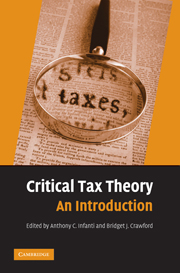Book contents
- Frontmatter
- Contents
- List of Illustrations
- List of Tables
- List of Contributors
- List of Common Abbreviations
- Introduction
- CHAPTER 1 FOUNDATIONS OF CRITICAL TAX THEORY
- CHAPTER 2 HISTORICAL PERSPECTIVES ON TAXATION
- CHAPTER 3 THE GOALS OF TAX POLICY
- CHAPTER 4 CRITICAL TAX THEORY MEETS PRACTICE
- CHAPTER 5 RACE AND TAXATION
- CHAPTER 6 GENDER AND TAXATION
- CHAPTER 7 SEXUAL ORIENTATION AND TAXATION
- Same-Sex Couples and the Federal Tax Laws
- The Internal Revenue Code as Sodomy Statute
- Heteronormativity and Federal Tax Policy
- Death Taxes: A Critique from the Margin
- Homo Sacer, Homosexual: Some Thoughts on Waging Tax Guerrilla Warfare
- CHAPTER 8 THE FAMILY AND TAXATION
- CHAPTER 9 CLASS AND TAXATION
- CHAPTER 10 DISABILITY AND TAXATION
- CHAPTER 11 GLOBAL CRITICAL PERSPECTIVES ON TAXATION
- CHAPTER 12 CRITICAL PERSPECTIVES ON CRITICAL TAX THEORY
- Index
Same-Sex Couples and the Federal Tax Laws
Published online by Cambridge University Press: 04 August 2010
- Frontmatter
- Contents
- List of Illustrations
- List of Tables
- List of Contributors
- List of Common Abbreviations
- Introduction
- CHAPTER 1 FOUNDATIONS OF CRITICAL TAX THEORY
- CHAPTER 2 HISTORICAL PERSPECTIVES ON TAXATION
- CHAPTER 3 THE GOALS OF TAX POLICY
- CHAPTER 4 CRITICAL TAX THEORY MEETS PRACTICE
- CHAPTER 5 RACE AND TAXATION
- CHAPTER 6 GENDER AND TAXATION
- CHAPTER 7 SEXUAL ORIENTATION AND TAXATION
- Same-Sex Couples and the Federal Tax Laws
- The Internal Revenue Code as Sodomy Statute
- Heteronormativity and Federal Tax Policy
- Death Taxes: A Critique from the Margin
- Homo Sacer, Homosexual: Some Thoughts on Waging Tax Guerrilla Warfare
- CHAPTER 8 THE FAMILY AND TAXATION
- CHAPTER 9 CLASS AND TAXATION
- CHAPTER 10 DISABILITY AND TAXATION
- CHAPTER 11 GLOBAL CRITICAL PERSPECTIVES ON TAXATION
- CHAPTER 12 CRITICAL PERSPECTIVES ON CRITICAL TAX THEORY
- Index
Summary
One of the arguments put forth by advocates of lesbian and gay marriage is that same-sex couples should be entitled to the same tax benefits enjoyed by married couples. Often, however, advocates of this position overlook the fact that the federal tax laws do not always bestow benefits on married couples. In addition to the “marriage penalty,” other tax detriments that married couples experience are: (1) joint and several tax liability on a joint return; (2) the inability to recognize losses on sales between spouses; and (3) numerous tax attribution rules that treat spouses as a unitary taxpayer.
Nonetheless, married couples do receive considerable tax benefits. Husband and wife can transfer wealth to each other free of income, estate, and gift taxes. Employers often provide important fringe benefits to the spouses of their employees. The federal tax law exempts the receipt of these benefits from income taxation. When married couples divorce, income tax rules are structured to allow the couple to unwind their property entanglements tax-free. Finally, for some married couples, the availability of the joint return does produce a tax savings.
None of these specially enacted tax benefits is available to lesbian and gay couples.
AGREEMENTS TO SHARE INCOME
Earned income is always taxed to the earner, unless the income is community property income. Despite the absence of satisfactory justifications for these results, the judiciary has held firm to this underlying rule for over sixty years now. Thus, there is no viable argument under current law by which a private agreement to split earned income can serve to split the income tax burden.
- Type
- Chapter
- Information
- Critical Tax TheoryAn Introduction, pp. 185 - 191Publisher: Cambridge University PressPrint publication year: 2009
- 1
- Cited by



